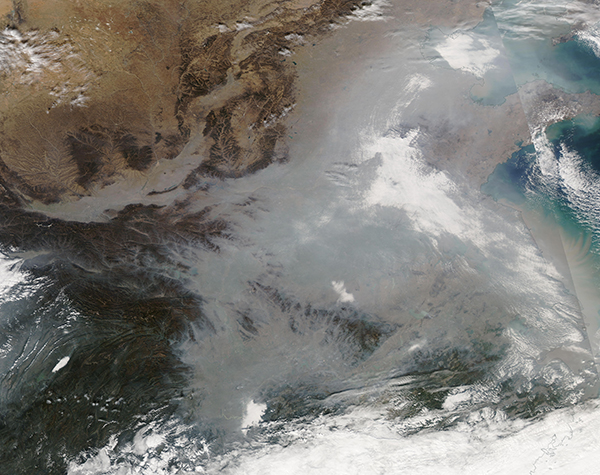Images
January 21, 2022 - Aerosols over China
Tweet
Heavy haze covered northeastern China through much of January 2022. The Moderate Resolution Imaging Spectroradiometer (MODIS) on board NASA’s Aqua satellite acquired a true-color image of the widespread, thick haze on January 18. The gray haze stretched roughly 1,500 km (930 mi) from north to south and spanned more than 1,200,000 square kilometers (463,322 square miles). For most of the expanse, the haze was so thick that it was impossible to see the land beneath.
Outbreaks of haze can occur any time in this region but large events, such as this one, are more common in the winter, when dropping temperatures trigger a need for warmth and increase the likelihood of temperature inversions. Air normally cools with altitude, with warm air near the ground and cool air up high. During a temperature inversion, warm air settles above a layer of cool air near the surface. The warm air acts like a lid, stopping air from rising through the warm layer. This traps pollutants near the surface, especially in basins and valleys. Common sources of pollution in the winter include coal and wood burning for heat, industrial activity, and vehicle emissions. Smoke from fires and dust storms can also contribute to poor air quality.
Image Facts
Satellite:
Aqua
Date Acquired: 1/18/2022
Resolutions:
1km (2.1 MB), 500m (6 MB), 250m (4.3 MB)
Bands Used: 1,4,3
Image Credit:
MODIS Land Rapid Response Team, NASA GSFC
Tweet
Heavy haze covered northeastern China through much of January 2022. The Moderate Resolution Imaging Spectroradiometer (MODIS) on board NASA’s Aqua satellite acquired a true-color image of the widespread, thick haze on January 18. The gray haze stretched roughly 1,500 km (930 mi) from north to south and spanned more than 1,200,000 square kilometers (463,322 square miles). For most of the expanse, the haze was so thick that it was impossible to see the land beneath.
Outbreaks of haze can occur any time in this region but large events, such as this one, are more common in the winter, when dropping temperatures trigger a need for warmth and increase the likelihood of temperature inversions. Air normally cools with altitude, with warm air near the ground and cool air up high. During a temperature inversion, warm air settles above a layer of cool air near the surface. The warm air acts like a lid, stopping air from rising through the warm layer. This traps pollutants near the surface, especially in basins and valleys. Common sources of pollution in the winter include coal and wood burning for heat, industrial activity, and vehicle emissions. Smoke from fires and dust storms can also contribute to poor air quality.
Image Facts
Satellite:
Aqua
Date Acquired: 1/18/2022
Resolutions:
1km (2.1 MB), 500m (6 MB), 250m (4.3 MB)
Bands Used: 1,4,3
Image Credit:
MODIS Land Rapid Response Team, NASA GSFC




